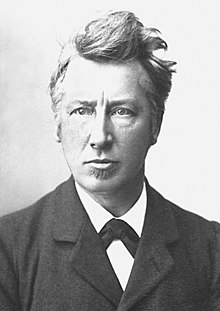Jacobus Henricus van 't Hoff
Dutch physical and organic chemist (1852-1911)
Jacobus Henricus van 't Hoff, Jr. (30 August 1852 – 1 March 1911) was a Dutch physical and organic chemist and the first winner of the Nobel Prize in Chemistry in 1901. He is best known for his discoveries in chemical kinetics, chemical equilibrium, osmotic pressure, and stereochemistry. Van 't Hoff's work in these subjects helped found the discipline of physical chemistry as it is today.

| This scientist article is a stub. You can help out with Wikiquote by expanding it! |
Quotes
edit- A famous name has this peculiarity that it becomes gradually smaller especially in natural sciences where each succeeding discovery invariably overshadows what precedes. [citation needed]
- It is sometimes easier to circumvent prevailing difficulties [in science] rather than to attack them. [citation needed]
- Whereas the chemico-chemists always find in industry a beautiful field of gold-laden soil, the physico-chemists stand somewhat farther off, especially those who seek only the greatest dilution, for in general there is little to make with watery solutions. [citation needed]
Quotes about van 't Hoff
edit- In that year [1874], Jacobus van’t Hoff and Joseph Le Bel added a third dimension to our ideas about organic compounds when they proposed that the four bonds of carbon are not oriented randomly but have specific spatial directions. Van’t Hoff went even further and suggested that the four atoms to which carbon is bonded sit at the corners of a regular tetrahedron, with carbon in the center.
- John McMurry, Organic Chemistry 8th ed. (2012), Ch. 1 : Structure and Bonding